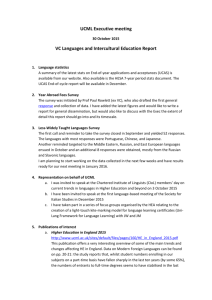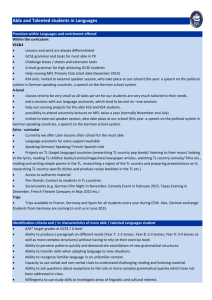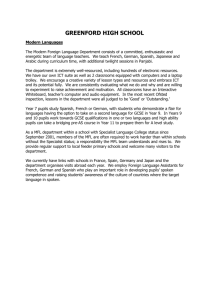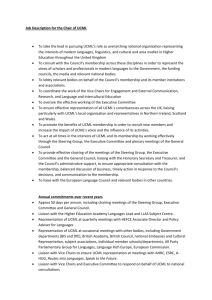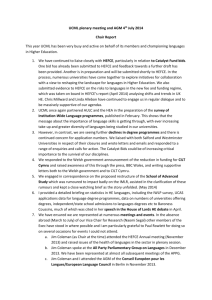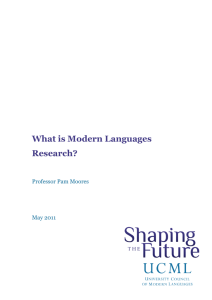Reports and profiles
advertisement
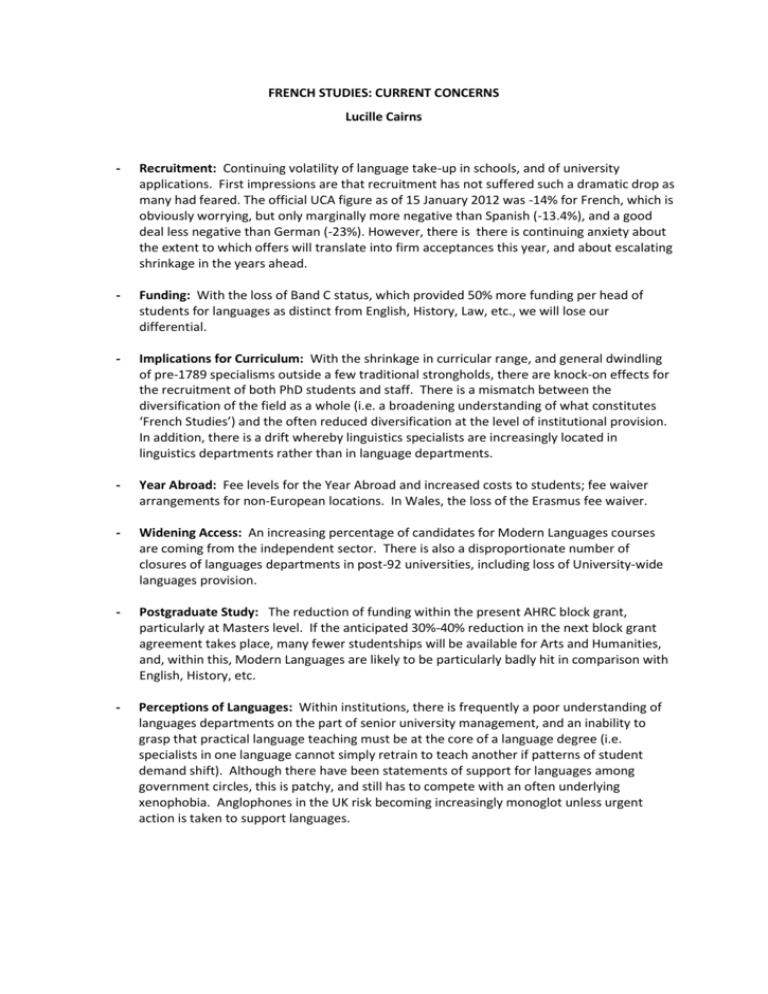
FRENCH STUDIES: CURRENT CONCERNS Lucille Cairns - Recruitment: Continuing volatility of language take-up in schools, and of university applications. First impressions are that recruitment has not suffered such a dramatic drop as many had feared. The official UCA figure as of 15 January 2012 was -14% for French, which is obviously worrying, but only marginally more negative than Spanish (-13.4%), and a good deal less negative than German (-23%). However, there is there is continuing anxiety about the extent to which offers will translate into firm acceptances this year, and about escalating shrinkage in the years ahead. - Funding: With the loss of Band C status, which provided 50% more funding per head of students for languages as distinct from English, History, Law, etc., we will lose our differential. - Implications for Curriculum: With the shrinkage in curricular range, and general dwindling of pre-1789 specialisms outside a few traditional strongholds, there are knock-on effects for the recruitment of both PhD students and staff. There is a mismatch between the diversification of the field as a whole (i.e. a broadening understanding of what constitutes ‘French Studies’) and the often reduced diversification at the level of institutional provision. In addition, there is a drift whereby linguistics specialists are increasingly located in linguistics departments rather than in language departments. - Year Abroad: Fee levels for the Year Abroad and increased costs to students; fee waiver arrangements for non-European locations. In Wales, the loss of the Erasmus fee waiver. - Widening Access: An increasing percentage of candidates for Modern Languages courses are coming from the independent sector. There is also a disproportionate number of closures of languages departments in post-92 universities, including loss of University-wide languages provision. - Postgraduate Study: The reduction of funding within the present AHRC block grant, particularly at Masters level. If the anticipated 30%-40% reduction in the next block grant agreement takes place, many fewer studentships will be available for Arts and Humanities, and, within this, Modern Languages are likely to be particularly badly hit in comparison with English, History, etc. - Perceptions of Languages: Within institutions, there is frequently a poor understanding of languages departments on the part of senior university management, and an inability to grasp that practical language teaching must be at the core of a language degree (i.e. specialists in one language cannot simply retrain to teach another if patterns of student demand shift). Although there have been statements of support for languages among government circles, this is patchy, and still has to compete with an often underlying xenophobia. Anglophones in the UK risk becoming increasingly monoglot unless urgent action is taken to support languages. Linguistics Kate Beeching Dear Kate I think the LAGB sees UCML primarily as protecting the linguistics of modern foreign languages as traditionally studied within departments of Modern Languages. There has been a tendency over the past twenty years or so for linguistics to be eliminated from such departments (as people retire or as posts become vacant for other reasons), with the subject becoming concentrated in departments of Linguistics, or within groupings connected with English. Increasingly the linguistics of English is becoming dominant within linguistics in the UK, and while this naturally presents some opportunities for the promotion of linguistics generally, it is dangerous for the study of the linguistics of other European languages, which, like some other aspects of modern languages, is in danger of losing the critical mass to maintain the subject. To any extent, these are of course part of a wider concern at a shift of focus away from foreign languages in schools, since students' route into linguistics in the UK is no longer primarily through studying foreign languages at school, but through English. So overall, if linguistics options are no longer available in modern languages departments, there is no way for anyone to come into linguistics via modern foreign languages, and the cycle will continue. David (Willis) UCML Scotland Mary Fischer Convenor: Professor Margaret-Anne Hutton, Head of the School of Modern Languages, University of St Andrews Membership: Universities of St Andrews, Edinburgh, Aberdeen, Glasgow, Stirling, West of Scotland, Highlands and Islands, Strathclyde, Heriot Watt, Edinburgh Napier, Scottish CILT, Open University (four Scottish HEIs no longer offer languages). Context: Fees: Scottish HEIs are not charging fees to Scottish/EU students, so current concerns in England on recruitment and the impact on the year abroad are less acute, but are nonetheless under review. EU students will now be required to pay a ‘management fee’ to study in Scotland. Recently issued UCAS statistics suggest recruitment is holding up well. Government initiatives: 1. The Convenor represents UCML Scotland on the Languages Manifesto Commitment Working Group (see: http://www.scotland.gov.uk/Topics/Education/Schools/curriculum/ACE/LanguageLearning/t ermsofreference ), the aim of which is to promote language learning in Scotland: "We will introduce a norm for language learning based on the European Union 1 + 2 model that is we will create the conditions in which every child will learn two languages in addition to their own mother tongue. This will be rolled out over two Parliaments, and will create a new model for language acquisition in Scotland." 2. Putting Learners at the Centre: Delivering our Ambitions for post-16 education. (http://www.scotland.gov.uk/Resource/Doc/357909/0120943.pdf) This initiative has resulted in the merger of FE colleges. A possible (distant) threat remains for universities. Page 47 contains a commitment to language provision in HEIs, although it makes a distinction between applied languages and traditional language degrees. Languages Baccalaureate: This is a new qualification being implemented by the Scottish Qualifications Agency (SQA) with the aim of encouraging school pupils to gain a Baccalaureate qualification in their final year of school by studying two foreign languages to Scottish Higher level and completing an interdisciplinary project. UCML Scotland broadly welcomes the initiative but has concerns that the level of assessed language content may not prepare pupils for the demands of year one university study. Individual Universities: Threats to individual departments seem to have been largely overcome, although there are still threats to provision in some areas. Some universities, notably Edinburgh and Aberdeen, have recently been able to increase provision for non-specialists. Report on German Studies Margaret Littler UCML Executive Committee 24 February 2012 Overview Despite recent serious threats to German Departments (Swansea, Glasgow), targeted‘disinvestment’ in specific fields (Bristol’s Early Modern specialist), non-replacement of posts (Manchester) and actual closures (Queens University Belfast), substantial German Studies programmes are offered at undergraduate level in a large number of Universities through the UK and Ireland. Most are incorporated into Schools of Languages or units including Languages and other subjects. UG Applications UCAS figure at 15 January 2012 -23% on 2011. Local variations may be attributable to variable fee regimes (eg tuition fees for residence abroad). University of Ulster reports a 20% rise over the past two years, with German possibly benfiting from the closure of German at QUB. German is still strong in grammar schools in NI, though some prestigious schools have also closed German. Related to the decline in German at A-Level, German is offered ab initio to degree level at a large number of Universities. Those currently not doing so are: Leeds, Durham, Oxford, Warwick, Sheffield, and UCL (Oxford and UCL report discussions about starting ab initio). PG Developments DAAD-co-funded German Studies Summer School Consortium. A collaboration around regional hubs of Universities, with lead institutions hosting summer schools: Edinburgh 2011, Birmingham 2012, Nottingham 2013, Manchester 2014, Oxford 2015, Leeds 2016, IGRS (London) 2017. Annual German Studies Postgraduate Colloquium alternates between IGRS and regional locations. External Agencies’ Support for German: 1) Deutscher Akademischer Austauschdienst (DAAD) the UK remains the No.1 partner for the DAAD, with high level of high quality applications for Language Tutor/Assistant posts at UK universities. DAAD posts have been withdrawn from Northern Ireland, Glasgow and Bristol. a new specialist Language Tutor post in German History at Edinburgh DAAD, German Embassy and HEIs collaborate in campaigns to promote German Studies in the UK (eg ‘Learn German’ campaign, ‘Sauerkraut Cup’ inter-varsity football tournament). DAAD remains an important source of funding for research travel to Germany, with specific programmes from PG/early career to senior research staff. Writer-in-Residence programme. 2) Österreichischer Auslandsstudentendienst, Zentrum für Internationale Kooperation & Mobility (ÖAD/ICM) a Government-sponsored, Vienna-based organisation, which currently provides administrative and financial support to more than 140 qualified Language Tutors at universities worldwide, including 14 LTs in the UK. 3) Goethe-Institut German cultural representation in the UK mainly funds German cultural activity in the UK (reading tours, theatre, music, visual arts). Representation and budgets for the UK have diminished since the 1990s. London, Glasgow, Dublin retain offices. Manchester has only skeleton staff; the G-I language courses are delivered through the University of Manchester Language Centre and continue to recruit well. Andrew Ginger I am likely to be able to brief on this more fully – if required – later this year, as there are (for example) no AHGBI executive meetings between autumn and spring, so it is difficult to gather information at short notice. So, these are basically my notes. Hispanic Studies is widely taught in universities in the UK. 29 UoAs submitted to the subject panel RAE 2008, and there are numerous other units in which the subject is taught, including many of those submitted to European Studies. The scale and range of units varies widelyfrom two or three academics up to 14 academics. Undergaduate under-recruitment has not been a problem in living memory across the discipline as a whole; rather the strains on the subject have often had to do with expansion and a balance between undergraduate numbers and staffing. There are initial reports of a decline in applications this year, but this decline does not seem to be so steep as in some other languages, and the full facts and real implications remain to be seen. There has been considerable flux in the situation and staffing of units teaching Hispanic Studies in recent years. Over a period of time, there was a pattern of significant expansion and investment, but more recently things have become more mixed. There have been in places declines in staffing numbers – and sometimes withdrawal of provision – within some language departments, usually as part of general retrenchment in languages rather than because of a problem that is specific to Hispanic Studies. Equally, Warwick is opening a new Spanish department in 2012, reflecting the continuing capacity for growth. The staffing numbers of some departments have oscillated, in general reflecting the present volatility of HE rather than anything subject specific.. The constituency, curricula, and foci of units vary considerably given the scale (geographical and linguistic) and range of the subjects involved. In common with other languages, major changes in foci arose with the influx of cultural studies and of other disciplines beyond literature such as cinema studies. In common with some other languages whose historical studies have not generally been part of UK history departments, Hispanic Studies units sometimes also house historians of Iberia and Latin America etc. This adds to the already inherent variety of the subjects studied. Correspondingly, there are several different subject associations – eg. AHGBI (Hispanic Studies in UK and Ireland), ACIS (contemporary Iberian, more social studies linked), SLAS (Latin American Studies). Portuguese and Lusophone Studies have aimed to assert a more distinct and autonomous subject identity recently and have founded a subject association – ABIL – while retaining their connections to other groupings such as AHGBI. Moreover, Hispanic Studies units can form a home for those working on the several languages of Iberia and for those studying linguistics, anthropology, and ethnology of indigenous Latin American peoples, for example. The global focus of the subjects concerned has been an increasing feature in recent years. Latin American Studies is now a staple of the discipline, and Global Lusophone Studies (including Africa and Asia) is a growing area. If I were to summarise the concerns among people in the subject, it might be the need to secure appropriate representation – at every level - for a subject with such a wide range of specialisms and such vast coverage, and, institutionally, in relative expansion. Vice Chair External Engagement and Communication Liz Andersen Role Profile Vice Chair, Engagement and External Communication, will deputise for the Chair as appropriate, and will liaise with the Chair and the Executive Committee with regard to strategic and policy approaches to the conduct of the specific responsibilities of the role. The Vice Chair, Engagement and External Communication is specifically responsible for: 1. Liaison with media and external relations professionals in CiLT and other national bodies to ensure synergies of messages 2. Liaison with THE and the press various, to ensure UCML’s voice is heard, and with other campaigns (eg Speak to the Future), to ensure UCML’s input 3. Liaison with employers’ and professional organisations on issues related to languages and language-based studies, student mobility and employability: eg Council for Industry and Higher Education (CIHE), Chambers of Commerce, CBI, careers services 4. Liaison with relevant International bodies eg European Language Council & Council of Europe to learn from wider international movements, policies and initiatives and to disseminate those of UK HE in relation to languages and language study 5. Developing communications strategies including the use of new media (eg Facebook, Twitter, LinkedIn) for enhanced communications between UCML and external stakeholders. Communications Strategies I should like to have a brief discussion with the Executive on developing communications strategies focused on the following questions: Who are our key audiences - both internal and external? What are we trying to communicate? What are going to be the best communication channels (given limited time and taking account of what our audience will respond to)? What should be prioritised? I should like to identify a limited number of goals with regard to channels of communication to be realised by the next Executive meeting through answering the following questions: UCML Website – is it as good as it could be given the limitations of time and resource? What are the various functions of the website, Facebook and Twitter for UCML? Should there be a Monthly e-mail bulletin with round-up of headline news to be sent out to constituency distribution lists by language and subject reps? Should there be a Plenary Jisc-Mail list (with moderator)? How can the Executive reps assist in enhancing communications between UCML and external stakeholders? Report on Modern Languages in Wales Claire Gorrara UCML Executive Meeting 24 February 2012 Overview : There are 11 contact members for UCML Wales based in the following institutions: Aberystwyth, Bangor, Cardiff, Cardiff Metropolitan, Glamorgan, Glyndwr, Open University, Swansea, Swansea Metropolitan, University of Wales Institute of Newport, Trinity Saint’s David’s. Only four of these HE institutions currently offer a full range of Single or Joint Honours UG MFL degrees. Indeed, provision is shrinking; Glamorgan has just cessed its final BA level MFL programmes. Modern languages at a number of Welsh institutions are centred on PCGE MFL training, for example Cardiff Metropolitan and Swansea Metropolitan. There is additional funding for MFL provision teaching via the medium of Welsh as part of the government-sponsored Coleg Cymraeg Cenedlaethol. Swansea has recently secured two new posts (French and Spanish) via this initiative Current Trends: Recent statistical data provided by HEFCW confirms a decline in students studying languages at GCSE and A level since 1999 (except for Spanish), in line with the rest of the UK: At GCSE, in 1999, there were 11,543 examination entries by 15 years olds in French. In 2011, that number had fallen to 5,906. The comparable figures for the other major European languages studied are as follows: German: 1999: 3,375, 2011: 1,376. Spanish: 1999: 742, 2011: 1,615. Over the same period, the percentage of 15 years olds studying at least one MFL at GCSE fell as follows: 1999: 44.7%, 2011: 24.9%. At A level, in 2001, there were 812 examination entries in French. By 2011: the figure was 505. The comparable figures for the other major European languages studied were: German, 2001: 320, 2011: 151. Spanish, 2001: 103, 2011: 169 Concerns raised by colleagues: The impact of the new fees regime on applications from Welsh students domiciled in Wales. Welsh students will have their fees subsidised by the Welsh government, whether they remain in Wales or study in other parts of the UK. How this will affect funding streams to Welsh universities is unclear. However, MFL, together with STEM subjects, have been classified as strategically important and vulnerable subjects, thereby ensuring ring-fenced funding at institutional level. Steep decline in opportunities to study German in secondary schools. It was reported at the Routes into Languages Steering Group meeting on 16 September 2011 that Pembrokeshire is the first LEA in Wales that does not offer German in any of its schools Continuing partnerships and current initiatives Partnership via Routes into Languages Cymru has been very successful as a means of sharing best practice and mobilising the MFL community in Wales. Follow on funding for RIL Cymru post-July 2012 is currently being sought Priority area for development in the largest MFL HE providers in Wales is Skills and Employability via, for example, work-based learning (Swansea) and accredited final-year and/or Erasmus teaching modules (Bangor and Cardiff) The Higher Education Academy Fil Nereo Events I would welcome suggestions for workshops and seminars that support staff working in Language disciplines. Current events include: TRANSITION, RETENTION AND SUCCESS IN THE ARTS AND HUMANITIES: HEA SUMMIT (8 March, British Academy, London, please contact jennie.osborn@heacademy.ac.uk asap). Stimulus presentations include: o Challenge to the Deans: Prof. Karl Leydecker, Professor of German and Comparative Literature and Dean of Humanities, University of Kent. o Widening Participation and Progression: Mark Crawley, Dean of Students and Director of Widening Participation and Progression, University of the Arts, London. o Challenge for Student Recruitment and Support: Ross Renton, Dean of Students, University of Hertfordshire. o Fall in Undergraduate Applications: Dr Graeme Atherton, Head of Access HE, London Higher. CONNECTING AT A DISTANCE: CREATING A COLLABORATIVE LANGUAGE LEARNING COMMUNITY (14 March, Warwick) ADVANCES IN DIGITAL LANGUAGE LEARNING AND TEACHING (20 April, UCLAN) EMBEDDING ENTERPRISE EDUCATION INTO THE LANGUAGES CURRICULUM (26 April, Manchester) FACILITATING LANGUAGE LEARNING THROUGH SOCIAL NETWORK SITES: INTEGRATING ADVISING INTO ONLINE TEACHING (8 May, Hull) PEDAGOGIES OF HOPE AND OPPORTUNITY: HEA ARTS AND HUMANITIES ANNUAL CONFERENCE (29 May, Glasgow) HEA ANNUAL CONFERENCE (3-4 July, Manchester) Full details are available at: http://www.heacademy.ac.uk/events?disciplines=Languages All events (except the ‘Conferences’ in May and July) are free to attend. The HEA is able to support attendance at events through its Travel Fund. Evidence gathering and analysis The HEA is able to support research, surveys, and other projects that seek to shape policy and/or enhance practice. Projects may be: Language-specific, Relevant to certain ‘groups’ of languages (e.g. those with low recruitment figures, languages of emerging economies, etc.) Relevant to all language disciplines. I would welcome your ideas and suggestions for future projects. Teaching Development Grants – Collaborative Scheme This bid-based development grant funding exists to stimulate evidence-based research and encourage innovations in learning and teaching that have the potential for sector-wide impact. The collaborative grant themes are internationalisation or employability. Up to £60,000 is available per project. Project duration will be 18 months. The project lead must be a Fellow of the Academy. Successful bids will demonstrate longitudinal impact and will include evaluation and dissemination criteria. Match-support should be sought from the participating HEIs. Call opens 27 February, the submission deadline is 22 April.

